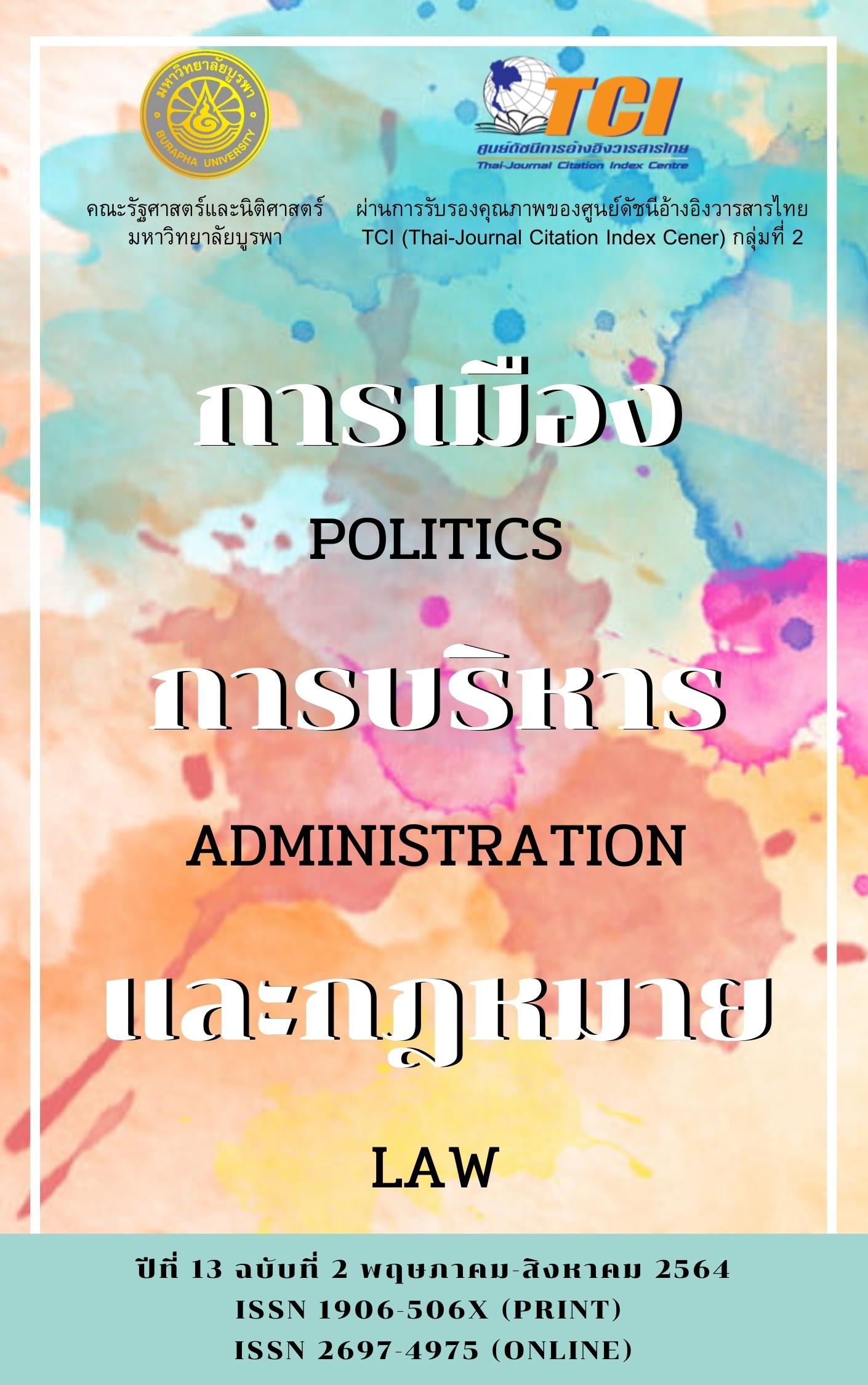การร่วมผลิตในการบริหารจัดการโรงเรียนผู้สูงอายุในพื้นที่ สำนักงานทรัพย์สินส่วนพระมหากษัตริย์ (เขตวังทองหลางและเขตห้วยขวาง) กรุงเทพมหานคร
คำสำคัญ:
การร่วมผลิต, โรงเรียนผู้สูงอายุ, การบริหารจัดการโรงเรียนบทคัดย่อ
การวิจัยเชิงคุณภาพเรื่อง การร่วมผลิตในการบริหารจัดการโรงเรียนผู้สูงอายุในพื้นที่สำนักงานทรัพย์สินส่วนพระมหากษัตริย์ (เขตวังทองหลางและเขตห้วยขวาง) กรุงเทพมหานคร มีวัตถุประสงค์ เพื่อศึกษาเงื่อนไขที่ทำให้เกิดการร่วมผลิตและลักษณะการร่วมผลิตในการบริหารจัดการโรงเรียนผู้สูงอายุในพื้นที่สำนักงานทรัพย์สินส่วนพระมหากษัตริย์ (เขตวังทองหลางและเขตห้วยขวาง) กรุงเทพมหานคร ผลการศึกษาพบว่า การร่วมผลิตในการบริหารจัดการโรงเรียนผู้สูงอายุนี้ มีศูนย์ส่งเสริมและพัฒนาศักยภาพผู้สูงอายุ 11 ชุมชน เขตวังทองหลางและเขตห้วยขวาง ในฐานะเป็นพลเมืองหรือผู้ใช้บริการ ในขณะที่ สำนักงานทรัพย์สินส่วนพระมหากษัตริย์ กลุ่มอรุณอินสยาม สำนักงานเขตวังทองหลาง คณะพยาบาลศาสตร์ จุฬาลงกรณ์มหาวิทยาลัย คณะสังคมสงเคราะห์ศาสตร์ มหาวิทยาลัยธรรมศาสตร์ อยู่ในฐานะผู้มี ส่วนร่วมมืออาชีพ เงื่อนไขที่ทำให้เกิดการร่วมผลิตในการบริหารจัดการโรงเรียนผู้สูงอายุ คือ ปัจจัยด้านเศรษฐกิจ การตอบสนองความต้องการด้านจิตใจ ประโยชน์จากการร่วมผลิต และความเหมาะสมกับลักษณะของผู้สูงอายุ ส่วนลักษณะการร่วมผลิตในการบริหารจัดการโรงเรียนผู้สูงอายุ ได้แก่ การร่วมจัดการ การร่วมวางแผนและตัดสินใจ การร่วมออกแบบ การร่วมส่งมอบบริการและการร่วมการประเมินผล
เอกสารอ้างอิง
กรมกิจการผู้สูงอายุ. (2563). ภาพรวมสถานการณ์ผู้สูงอายุ. ม.ป.ป.
กระทรวงการคลัง. (2561). ปี 2573 จะมีผู้สูงอายุมากกว่า 1 ใน 4 ของประชากร ตั้งงบประมาณดูแลทะลุหลัก3 แสนล้าน!. วันที่ค้นข้อมูล 29 มีนาคม 2563, เข้าถึงได้จากhttps://www.matichonweekly.com/column/article_111363
ปิยากร หวังมหาพร. (2559). บทบาทอาสาสมัครดูแลผู้สูงอายุที่บ้าน: การเปลี่ยนแปลงจากการปกครองสู่การบริหารปกครองสาธารณะ. วารสารการเมือง การบริหารและกฎหมาย, 8(2), 33-58.
มูลนิธิสถาบันวิจัยเพื่อการพัฒนาประเทศไทย (ทีดีอาร์ไอ). (2561). TDRI เผย 15 ปีข้างหน้า รายจ่าย สุขภาพคนไทยพุ่ง 1.8 ล้านล้านบาท.…หายนะสุขภาพที่ประเทศต้องแบกรับ. วันที่ค้นข้อมูล 29 มีนาคม 2563, เข้าถึงได้จาก https://www.salika.co
มูลนิธิสถาบันวิจัยเพื่อการพัฒนาประเทศไทย (ทีดีอาร์ไอ). (2555). โครงการวิจัยการประมาณการงบประมาณสําหรับผู้สูงอายุและแหล่งที่มาของเงิน. วันที่ค้นข้อมูล 29 มีนาคม 2563, เข้าถึงได้จาก www.tdri.or.th
สำนักงบประมาณ. (2560). งบอุ้มสังคมสูงวัยพุ่ง อีก 20 ปี เฉียด 5 แสนล้าน. วันที่ค้นข้อมูล 29 มีนาคม 2563, เข้าถึงได้จาก https://www.thansettakij.com/content/210038
โรงเรียนผู้สูงอายุ เสริมพลังวัยเกษียณช่วยตนเอง. (2561). วันที่ค้นข้อมูล 26 มีนาคม 2563, เข้าถึงได้จาก http://naewna.com/likesara/317964
วรนาถ พรหมศวรและคณะ. (2559). โรงเรียนผู้สูงอายุมุมมองตามบริบทชุมชนท้องถิ่น สุรินทร์. ใน การประชุมวิชาการระดับชาติ“ราชมงคลสุรินทร์วิชาการ ครั้งที่ 8” “วิจัยเพื่อประเทศไทย 4.0” มหาวิทยาลัยเทคโนโลยีราชมงคลอีสาน วิทยาเขตสุรินทร์. เมื่อ 22-23 ธันวาคม 2559, หน้า 115-127.
สำนักอนามัย กรุงเทพมหานคร. (2559). กทม. เผยอีก 2 ปี ผู้สูงอายุเพิ่มมากขึ้น. วันที่ค้นข้อมูล 30 มีนาคม 2563, เข้าถึงได้จาก www.bangkokbiznews.com
Bovaird, T. (2007). Beyond Engagement and Participation: User and Community Coproduction of Public Services. Public Administration Review, 67(5), 846-860.
Bureau of Health, Bangkok Metropolitan. (2016). Bangkok Revealed Another 2 Years, More Elderly. Retrieved March 30, 2020, from www.bangkokbiznews.com
Bureau of Budget. (2017). The Budget for Carrying Older Society is Rising for Another 20 Years, Close to 5 Billion. Retrieved March 29, 2020, from https://www.thansettakij.com/ content/210038
Daneshvar et al. (2018). How Can Social Media Lead to Co-Production (Co-Delivery) of New Services for the Elderly Population? A Qualitative Study. JMIR Hum Factors, 5(1), e5.
Department of Elderly Affairs. (2020). Overview of the Situation of the Elderly. n.p.
Elderly School Empower Retirement to Help Oneself. (2018). Retrieved March 26, 2020, from http://naewna.com/likesara/317964
Etgar, M. (2009). Ways of Engaging Consumers in Co-production. Retrieved April 1, 2020, from https://timreview.ca/article/307
Joshi, A., & Moore, M. (2003). Institutionalised Co-Production: Unorthodox Public Service Delivery in Challenging Environments.Institute of Development Studies, Research Summary No. 18. Retrieved July 19, 2007, from http://www.ids.ac.uk/gdr/cfs/drpubs/summaries/summary%2018-MooreJoshi-InstiCoprod.pdf
Löffler, E. (2009). A Future Research Agenda for Co-production: Overview Paper. In Local Authorities & Research Councils’ Initiative (2010) Co-production: A series of commissioned reports, Swindon: Research Councils UK.
Löffler, E. (2010). Why Co-production is an Important Topic for Local Government. In Paper for Local Authorities and Research Council’ Initiative Governance International. Retrieved April 1, 2020, from elke.loeffler@govint.org
Ministry of Finance. (2018). By 2030, More Than 1 in 4 of the Elderly Will Set a Budget to Take Care of Over 3 Billion!. Retrieved March 19, 2020, from https://www.matichonweekly.com/column/article_111363
Nabatchi, T., Sancino, A., & Sicilia, M. (2017). Varieties of Participation in Public Services: The Who, When, and What of Coproduction. Public Administration Review, 77(5).
Nopraenue Sajjarax Dhirathiti. (2019). Co-production and the Provision of Lifelong Learning Policy for Elderly People in Thailand. Public Management Review, 21(7), 1011-1028.
Osborne, S. P.; Strokosch, K. (2013). "It takes Two to Tango? Understanding the Co-production of Public Services by Integrating the Services Management and Public Administration Perspectives: It takes Two to Tango?". British Journal of Management, 24, S31–S47.
Ostrom, E. (1996). Crossing the Great Divide: Coproduction, Synergy and Development. World Development. 24(6), 1073 – 1087.
Pestoff, V. (2018). Co-production at the Crossroads of Public Administration Regimes. In Brandsen, T(Ed). Co-Production and Co-Creation: Engaging Citizens in Public Services. New York: Routledge.
Promsuan, W. et al. (2016). Seniors School a Local Community Context Surin. In National Academic Conference "Rajamangala University of Technology Surin 8th" "Research for Thailand 4.0" Rajamangala University of Technology Isan Surin Campus. On 22-23 December 2016. Page 115-127.
Procter et al. (2014). The Day-to-Day Co-Production of Ageing in Place. Comput Support Coop Work, 23(3), 245–267.
Ramirez, R. (1999). Value Co-Production: Intellectual Origins and Implications for Practice and Research. Strategic Management Journal, 20(1), 49-65.
Thailand Development Research Institute (TDRI). (2018). TDRI Revealed that in the Next 15 Years, Thai Health Expenditure Will Rise 1.8 Trillion Baht ... the Health Disaster that the Country Has to Bear. Retrieved March 29, 2020, from https://www.salika.co
Thailand Development Research Institute Foundation (TDI). (2012). Research Project, Budget Estimation for the Elderly and the Source of Money. Retrieved March 19, 2020, from www.tdri.or.th
Whangmahaporn, P. 2016. Role of Care-for-the-Elderly-at-Home Volunteers: Transforming from Government to Public Governance. Journal of Politics, Administration and Law, 8(2), 33-58.
ดาวน์โหลด
เผยแพร่แล้ว
ฉบับ
ประเภทบทความ
สัญญาอนุญาต

อนุญาตภายใต้เงื่อนไข Creative Commons Attribution-NonCommercial-NoDerivatives 4.0 International License.






